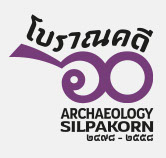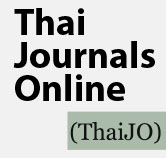
คัมภีร์รำผีของชาวมอญบางขันหมากลพบุรี
SPIRITUAL DANCE IN BANGKHANMARK LUBURI
โดย บำรุง คำเอก / By Bamroong Kam-Ek
Damrong Journal, Vol 6, No.2, 2007
บทคัดย่อ:
บางขันหมากเป็นหมู่บ้านเล็กๆ ในจังหวัดลพบุรี มีคนมอญอาศัยอยู่ 8 หมู่บ้าน ในจำนวน 12 หมู่บ้าน คนมอญที่นี่มีวิถีมีชีวิตความเป็นอยู่ยังเป็นแบบมอญอยู่อย่างแน่นเหนียว ในเรื่องประเพณีวัฒนธรรมมอญ ความเชื่อ เช่น การรำผี การเลี้ยงผี การละเล่นพื้นบ้าน ผู้เขียนได้พบคัมภีร์รำผีของชาวอญบางขันหมาก เป็นสมบัติของนางปัทมา ขำดี มีอาชีพเป็นโต้งทำพิธี เลี้ยงผี และเข้าทรงปัดรังควาณสิ่งชั่วร้าย ให้กลายดี คำว่ารำผี ตรงกับภาษามอญว่า “ลิห์ฮนา” แปลว่ารำที่ปะรำพิธี เข้าใจคนไทยเวลามาดูพิธีรำจะเรียกว่า “รำผี” คัมภีร์จะถูกใช้โดยโค้งตามลำดับ เนื้อหาในคัมภีร์พูดถึงขั้นตอนการประกอบพิธี คัมภีร์รำผี โต้งหรือผู้จัดการพิธีเป็นผู้สั่งให้ทำในแต่ละขั้นตอน เริ่มด้วยหัวหน้าจะทำพิธีด้วยเครื่องเซ่นไหว้สำหรับเลี้ยงผี แล้วเรียกผีบ้าน ผีจากเมืองเมืองมอญ ผีตามสถานที่ต่างๆให้ทายาทที่เป็นต้นผี กินปลาย่าง เรียกมิตรสหาย หนุ่มชาวนา แม่ทัพ เจ้านาย แล้วเล่นสะบ้า ชนไก่ คล้องช้าง สุดท้ายนำอาหารที่เหลือ และต้นกล้วยที่ถูกตัด ใส่ลงในเรือที่ทำด้วยต้นกล้วยแล้วลอยเรือไปในแม่น้ำเหมือนลอยความชั่วออกไป
ABSTRACT:
Bangkhanmark is a small Tam-bon comprising twelve small villages. Only eight villages have Man residents. They still pursue their traditional way of life, including performing mystical spiritual dances, folk plays, etc. The author met with Mrs. Pathma Khamdi, a 'Tong', or shaman, who possesses a mystical text. Mrs. Pathma acts as a spiritual medium, managing ceremony of mystical spiritual dance, offering food to spirits, driving away bad things from people and villages, and inducing good luck.
The mystical dance is called 'Ram Phee' (in Thai) or 'Lih Hana' (in Man). The Man term 'Lih Hana' means 'dancing in the pavilion.' It is believed that the term 'Ram Phee' was given by Thai people who had a chance to observe the ceremony. Traditionally, 'Tong' is the only person who can access the mystical text which contains details of the sacred ceremony. As a result, the ceremony can only be held under Tong's command.
The rite normally begins with the family offering food to the ancestral spirits and guardian angels. Then the male heir of the family would be fed with grilled fish. Towards the end of the ceremony, the family invites male neighbors to join a feast and to play some traditional games such as Saba, cock fighting, and elephant hunting. After the feast, whatever is left over, together with a banana tree which has been chopped up, would be floated away in a small boat made from a banana trunk. According to the Mon•s belief, it is like floating away evils.











